#deb whitman
Explore tagged Tumblr posts
Text




If we're going by the "closing the door behind you means sex" standard then by 1981 Pete's been with Mary Jane, Betty Brant, Deb Whitman, and Marcy Kane. Just figured you'd all want to know.
#spider-man#mary jane watson#betty brant#marcy kane#deb whitman#one of them is an alien#marvel comics
161 notes
·
View notes
Text
Juneteenth Celebrations Around Huntington
Juneteenth has blossomed into multiple celebrations this year in Huntington, with music, fashion and poetry among the ways people will mark the end of the American legacy of slavery. Wednesday On Wednesday, the Caribbean American Poetry Association, with Deb Thivierge, Founder and executive director of ELIJA, will host a poetry reading for Juneteenth and Caribbean American Heritage Month. That…

View On WordPress
#Caribbean American Poetry Association#Carirbbean America Poetry Association#Deb Thivierge#Elija Farm#Melisa Rousseau#Rhonda Gooden#Walt Whitman Birthplace
0 notes
Note
What are your thoughts on your friendly neighborhood spider-man?
I'm probably not going to watch it. Like, it looks fine, it's just that I know the Peter characterization is going to annoy me beyond reason so I'm not putting myself through that. I think the choices surrounding the Osborns are interesting -- I've previously talked about how I think there's an interesting interpretation of Norman and Harry as either Black or Jewish, because those are basically the only ethnic groups where the famous "Osborn hair" curl pattern shows up, but that with Norman in particular you need to balance it on Peter's side by admitting some things canonically, which I don't see YFNSM doing. But I do like the decision and I think Norman's role in it seems interesting. It's just Peter where I'm like I'm not doing this to myself. It's always just Peter.
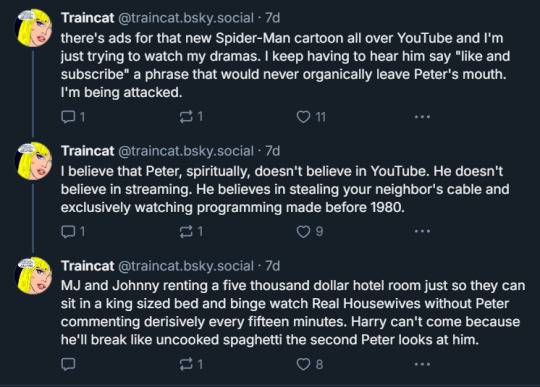
I'm standing by these comments. I was just trying to watch gay tomb raiding nonsense and I was assaulted.
But I'm trying to do this thing where I'm not endlessly bitter about recent Spider-Man so instead I'm going to rec Friendly Neighborhood Spider-Man (2005) (NOT 2019 that was a disaster) (you want Peter David you don't want Tom Taylor) as a comic because I think it does some really fun stuff.
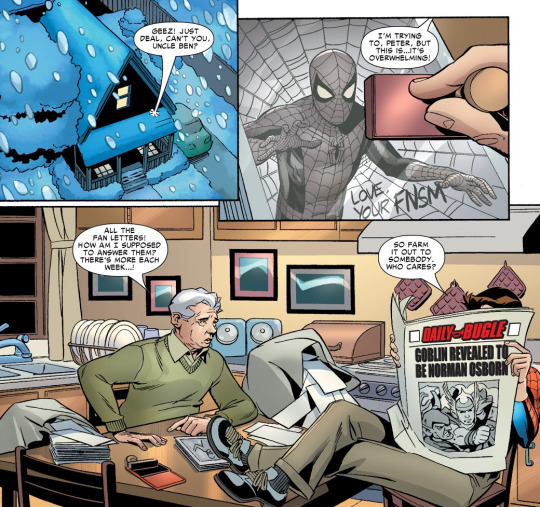
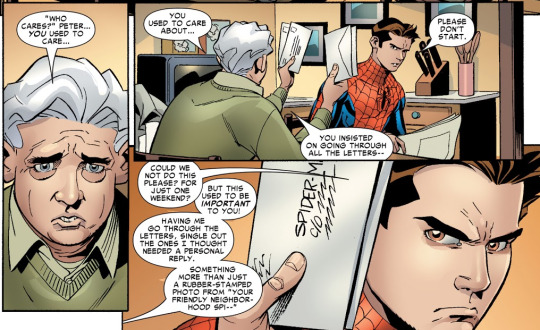
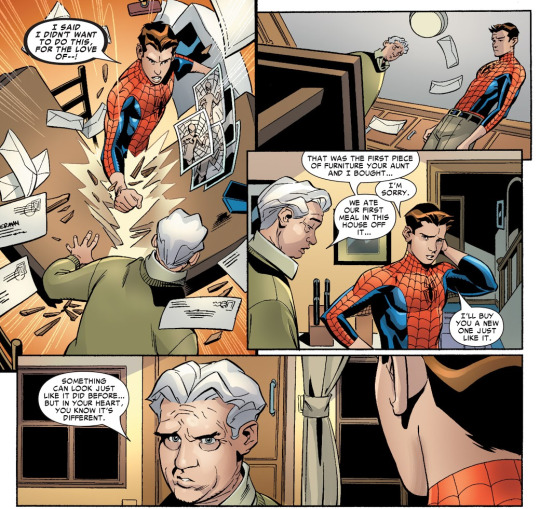
Really interesting arc looking at what would happen with Peter if May had died instead of Ben! Really exploring May's influence on Peter and how she's the person who made him as good and kind as he is! (Friendly Neighborhood Spider-Man #8)
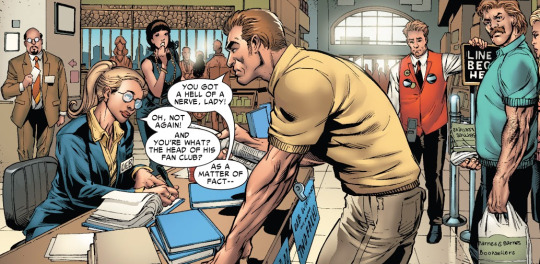
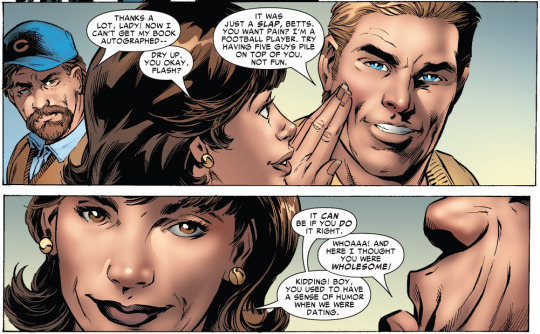
Interesting fallout from Civil War! The revenge of Deb Whitman, the woman Peter drove to a mental breakdown just by being himself! Flash defending Peter! That's his man! Betty is here! (Friendly Neighborhood Spider-Man #16)
"I thought you were wholesome!" okay gay boy.
Also note Flash's clothes -- they're the same clothes Peter is wearing at the start of Back in Black, which means he was crashing at Flash's place when he was on the lam after switching sides in Civil War. I love them.

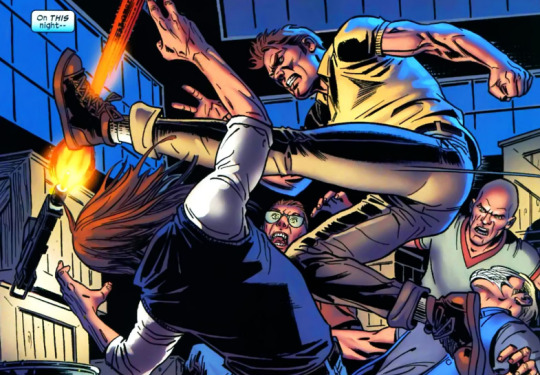
The cuffs are even rolled up on the pants! Peter's either 5'10" or 6' even depending on what canon source you trust, and Flash was 6'2" before he lost his legs, so that's a fun detail with the pants. (ASM #539)
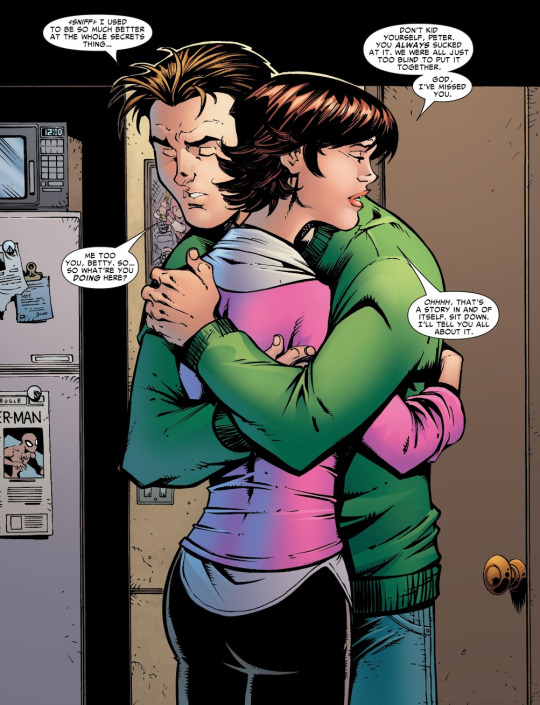
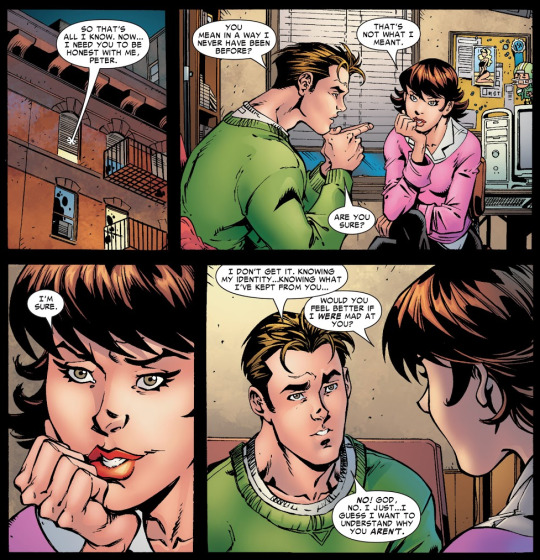
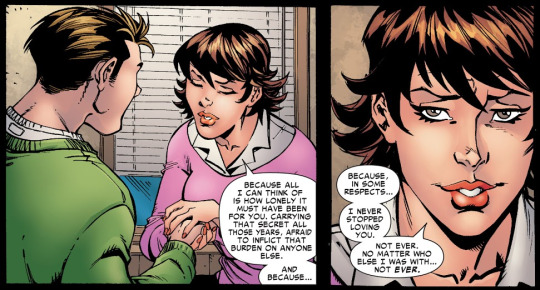
Peter and Betty being freaks about each other! Betty getting to know, even if only just for a bit, that Peter is Spider-Man! She never stopped loving him, not ever, no matter who else she was with! Not ever! Freaks! (Friendly Neighborhood Spider-Man#20)
Also an otherworldly spider monster tries to lay eggs in Flash. Because that's a thing that happens.
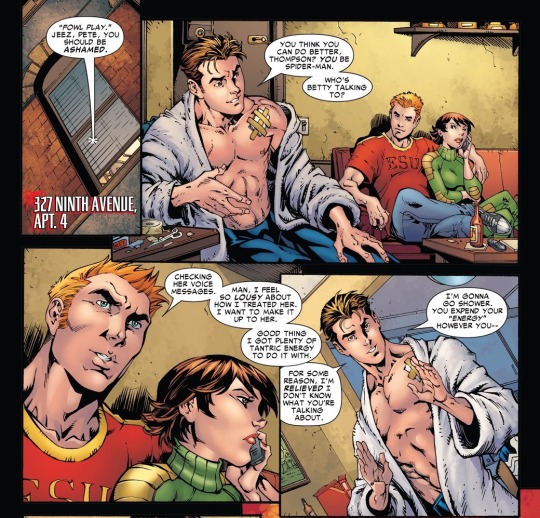
Why are the three of them like this. (Friendly Neighborhood Spider-Man #22)
I have my issues with Peter David but he is a very solid Spider-Man writer and there's some really good fallout from Peter's Civil War identity reveal here. Jonah gets to punch him in the face and it's deserved.
53 notes
·
View notes
Text
Emily Singer at Daily Kos:
Republican lawmakers are explicitly saying they are looking into cutting Social Security to pay for President Donald Trump's tax cuts—touching the third rail of politics as they seek to pass Dear Leader's agenda. Republican Rep. Riley Moore of West Virginia, told Fox Business' Maria Bartiromo on Monday that Republicans have been “discussing” cutting mandatory spending—that is Social Security, Medicare, Medicaid, and veterans benefits—in order to pass Trump's tax cut agenda, which will require trillions in reciprocal cuts if Republicans want to make it a reality. "That's what we've been discussing," Moore said. "This is our once in a lifetime opportunity."
Republican Sen. Mike Lee of Utah, also went even further in a post on X, saying that, "Social Security [is] a ripoff for most Americans compared to essentially any legitimate retirement investment." The comment was in response to a post from co-President Elon Musk, who pushed incorrect information about how Social Security works to claim the program is rife with fraud. Musk loves to use claims of fraud as justification to slash federal spending through the Department of Government Efficiency, an advisory commission Trump created in order to cut the federal budget. "Just learned that the social security database is not de-duplicated, meaning you can have the same SSN many times over, which further enables MASSIVE FRAUD!! Your tax dollars are being stolen," Musk wrote. In fact, the news outlet Semafor reported that Social Security benefits are indeed next on DOGE’s list for cuts.
[...] Cutting Social Security benefits could cause a massive backlash from voters. A January poll from the American Association of Retired Persons found that 85% of Americans say they want Social Security benefits to be maintained, even if that requires raising taxes. “It is rare in today’s political climate to see people unite around anything, but virtually all Americans want their Social Security benefits to be preserved and are willing to do what it takes to ensure the program continues to provide meaningful support for future generations,” Deb Whitman, AARP’s chief public policy officer, said in a statement on the findings. But Social Security isn’t the only social safety net program that Republicans want to slash in order to pay for Trump’s tax cuts for the rich. Republican Rep. Andy Harris of Maryland, also went on Bartiromo's show Monday morning to say that Republicans are also looking to implement work requirements for Medicaid and food stamps.
Republicans seek cuts to Social Security, Medicaid, Medicaid, and veterans’ benefits to fund for tax cuts for the wealthy.
#Social Security#Elon Musk#Taxes#Riley Moore#Medicaid#Medicare#DOGE#Department of Government Efficiency#Mike Lee#Musk Coup#Medicaid Work Requirements#Andy Harris
39 notes
·
View notes
Text

Peter Parker, The Spectacular Spider-Man #73 (Mantlo/Hannigan, Dec 1982). Final exams approach! Doc Ock is loose! But what are we gonna do about anxious Deb Whitman figuring out Pete’s secret identity?!
#marvel#marvel 616#peter parker the spectacular spider man#peter parker#spider man#otto octavius#doctor octopus#bill mantlo#ed hannigan
9 notes
·
View notes
Text
The Owl House: The New Year’s Special

Sarah-Nicole Robles
Wendie Malick
Alex Hirsch
Mae Whitman
Tati Gabrielle
Issac Ryan Brown
Zeno Robinson
Elizabeth Grullon
Cissy Jones
Avi Roque
Keston John
Matt Chapman
Michaela Dietz
Grey DeLisle
Erica Lindbeck
Ryan O’Flanagan
Kimberly Brooks
Ally Maki
Kari Wahlgren
Cast:
Princess: DEE BRADLEY BAKER
Gilbert Park & Faust: ERIC BAUZA
Barcus: BOB BERGEN
Professor Hermonculous: J.B. BLANC
Salty: STEVE BLUM
Gus Porter: ISSAC RYAN BROWN
Skara & Eileen: KIMBERLY BROOKS
Mason: BRUCE CAREY
Steve Tholomule & Harvey Park: MATT CHAPMAN
Tibblet-Tibblie Grimm Hammer III “Tibbles”: PARVESH CHEENA
Manny Noceda: WILSON CRUZ
Adrian Graye Vernworth: NOSHIR DALAL
Bria: FELICIA DAY
Tía Valentina Noceda: ARIANA DeBOSE
Prima Gabi Noceda: ELIJAH DeJESUS
Masha, Katya, Cat, Usurper, & Bonesborough Brawl Security Guard: GREY DeLISLE
Matt Tholomule: JORGE DIAZ
Vee Noceda: MICHAELA DIETZ
Gavin: NIK DODANI
Gwendolyn Clawthorne: DEB DOETZER
Osran: JASON DOUGLAS
Willow Park: TATI GABRIELLE
Flora D’splora: EILEEN GALINDO
Dell Clawthorne: PETER GALLAGHER
Jerbo: NOAH GALVIN
Long-Haired Bat Kid: KIMIKO GLENN
Camila Noceda: ELIZABETH GRULLON
Angmar: HARVEY GUILLÉN
Eye-Eating Monster, Snaggleback, & Papa Titan: ARIN HANSON
King Clawthorne & Hooty: ALEX HIRSCH
Mohawk Bat Kid: HOLLY @hollowtones
Bill: CHRIS HOUGHTON
Tío Emilio Noceda: OSCAR ISAAC
Darius Deamonne: KESTON JOHN
Lilith Clawthorne: CISSY JONES
Kikimora: MELA LEE
Vitimir: JASON LIEBRECHT
Emira Blight: ERICA LINDBECK
Braxas: KEVIN LOCARRO
Odalia Blight: RACHAEL MACFARLANE
Viney: ALLY MAKI
Eda Clawthorne: WENDIE MALICK
Morton: SHANNON McKAIN
Olive (Gabi’s Girlfriend): MOSCO MOON
Abuela Luna Noceda: RITA MORENO
Edric Blight: RYAN O’FLANAGAN
Tío Mateo Noceda: JOHNNY ORTIZ
Bucket Hat Bat Kid: PENNY @snapscube PARKER
Alador Blight: JIM PIRRI
Azura: ANAIRIS QUIÑONES
Philip Wittebane/Emperor Belos: MATTHEW RHYS
Tarak, Bonesborough Brawl Commentator, & Tom: KEVIN MICHAEL RICHARDSON
Boscha, Amelia, Bo, & Abominations: EDEN RIEGEL
Hieronymus Bump: BUMPER ROBINSON
Hunter, Derwin, & Male Camp Friend: ZENO ROBINSON
Luz Noceda: SARAH-NICOLE ROBLES
Raine Whispers: AVI ROQUE
Bat Queen: ISABELLA ROSSELINI
Jacob Hopkins & Warden Wrath: ROGER CRAIG SMITH
Female Camp Friend: HAILEE STEINFELD
Greater Basilisk: APRIL STEWART
Graveyard Keeper: CHRISTOPHER SWINDLE
Malphas: FRED TATASCIORE
Hettie Cutburn: JEN TAYLOR
Tinella Nosa & Severine: DANA TERRACE
Hecate & Harper (Gabi’s Other Girlfriend): MORGAN TERRY
Amber, Eberwolf, Villainous Lucy, & Barista: KARI WAHLGREN
Amity Blight: MAE WHITMAN
Perry Porter: GARY ANTHONY WILLIAMS
Terra Snapdragon: DEBRA WILSON
The Collector: FRYDA WOLFF
#the owl house#dana terrace#happy new year#luz noceda#eda clawthorne#king clawthorne#hooty#amity blight#willow park#gus porter#hunter#camila noceda#lilith clawthorne#raine whispers#darius deamonne#steve tholomule#vee noceda#masha#emira blight#edric blight#skara#viney#bards against the throne#eberwolf#lumity#raeda#huntlow#veesha#melodybeast
14 notes
·
View notes
Text
guys what if cissy ironwood and deb whitman got married
make peter their best man and all
#cissy ironwood#debra whitman#peter parker#spiderman#guys im being serious here#they have the same vibe as gwenmj#imma tag#coffee bean gang#they aint part of it but just for comic navigation bc im proud of using my brain cells to come up with this
12 notes
·
View notes
Text
I think Deb Whitman and Harry Osborn should be friends
56 notes
·
View notes
Text
Professional comic nerd types really wander around writing cringing, apologetic articles with titles like “In Defense of Deb Whitman” that are still vaguely character-bashing like it’s not a top quality premise that the one time Peter Parker dates somebody who isn’t as up to eleven batshit as he normally unthinkingly goes for he accidentally gaslights her into a mental breakdown without changing his behavior, just with his own native shifty obnoxiousness, and later she writes a bestselling book slamming him. Unbeatable. I’m aware that this is one of those posts you scroll past like "Hmm you’re neck deep in a nonsense I didn't know existed until you started talking about it."
148 notes
·
View notes
Photo

I’m honestly getting super tired of the “Peter is dragging Deb along” plot. Deb honey you can do better.
5 notes
·
View notes
Text

OOOH YEAH that's the look of a woman who finally knows why her life is so messed up. My profile series of Debra Whitman ends here. Last time we saw Deb written out of the series with a mental breakdown after discovering Peter Parker was Spider-Man. That was 1983 and now it's 2007 and Spidey's identity is public after the events of Civil War.
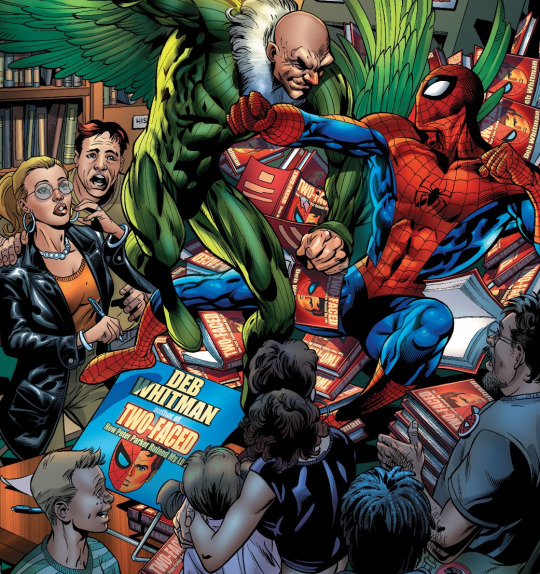
So naturally Deb has written a tell-all book. Well it was ghost written anyway. That's made her a target for The Vulture.


It's also made her a target for investigative reporter Betty Brant. Betty's life has also been ruined time and time again by her association with Spider-Man.
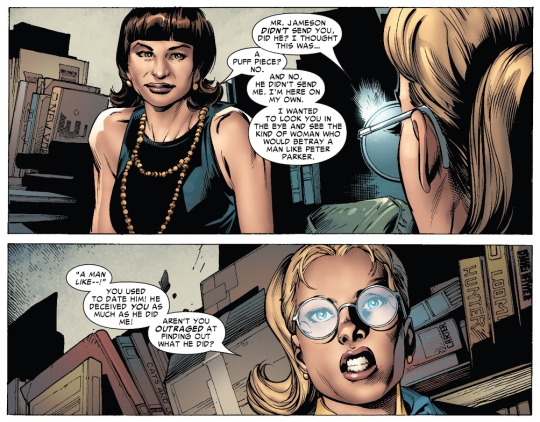
OOF that's the least flattering drawing of Betty ever. Anyway her angle is that her life makes more sense now that she knows Pete's secret and she's not scared of Spider-Man anymore because she trusts who's behind the mask.
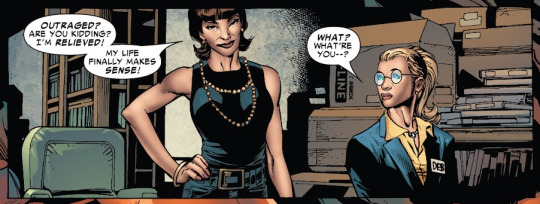
BRIEF INTERLUDE FOR PETE'S EMBARASSING DISGUISE AND DATED STEPHEN COLBERT CAMEO

So Vulture knocks out Spidey. He's in freefall as he imagines all the *deserved* terrible things Deb has to say to him.


But then at the last second (or last 20 seconds actually) Deb actually shouts out words of support!

"Wake up you idiot!" It's what I've been shouting at Pete this whole profile series!
As a final note, Deb goes to Betty and confesses that she only agreed to the book to get the money for her mom's medical bills. She and Betty conspire to anonymously publish a backtracking of the more salacious details of the book.
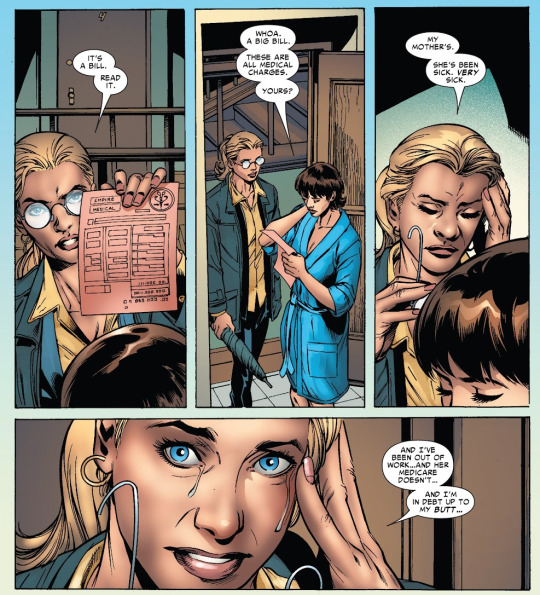

It's decades late but it's nice to that Debra got some vindication. Wait this is 2007... that's the same year of One More Day. That means immediately after this everyone's memory of Pete's secret identity and all evidence of it was wiped from the earth. So... all her books were erased and she's back to thinking she's crazy?! Maybe for the best she's never been brought back since.
26 notes
·
View notes
Text
#shes like fluttershys fuckin humansona what did she do to deserve any of this shit
Making my way through ssm and if there's one thing I've learned it's that, if there's one character who deserves to beat the shit out of Peter Parker, it's Debra Whitman oh my god, peter please be nice to her I'm losing it
#tags that made me laugh out loud#seriously though. we seem to be going through the same comics at the same pace and deb I'm so sorry#deb whitman#comics
8 notes
·
View notes
Note
Is peter a cheater in relationships?
I wouldn’t say that Peter is a cheater because for me to label a fictional character a cheater there has to be a strong and consistent pattern of infidelity present in their relationships, and that’s not true with Peter. If anything in a serious relationship he’s incredibly loyal -- I think it’s a mistake to view, for instance, the Gwen/Peter/MJ or Betty/Peter/Liz interactions as “traditional” love triangles where one party is torn between two romantic interests because in both in cases despite being pursued Peter displays a clear and consistent preference for the girl he’s with.


(ASM #96-97) Peter’s reaction to Mary Jane hitting on him, even while Gwen is in England, isn’t interest, but chagrin, which actually from Mary Jane’s perspective is I think a strong part of the reason she does hit on Peter in the issues leading up to Gwen’s death; it’s not to try and break up him and Gwen so much as viewing Peter as someone who is safe to play around with because he’s so loyal to Gwen, or as someone to test to see if he’d break that loyalty, in which case she could write him off as the same as other men.
It’s complicated! I love it! So no, Peter’s not a cheater -- I don’t think we can characterize him as having a pattern of infidelity in his romantic relationships.
This does not, however, mean he’s always behaved great in relationships. Which I think is realistic for a character with a long-running history, but for the sake of the discussion let’s run with it. Before Peter unmasked to Felicia, for instance, there is deception in his romantic relationships. It’s not the deception of infidelity, of sneaking around in a romantic sense, but he is sneaking around -- in his Spider-Man costume to fight crime. This kind of relationship problem isn’t unique to Spider-Man -- “masked hero hides identity from the object of their affection for their safety” is a pretty old tale, but Spider-Man does love to play it up for misunderstandings in relationships. Back when Peter and Betty were together in the Lee/Ditko run Betty often did wonder if Peter was seeing other girls when the reason behind his secretive behavior was Spider-Man.

(ASM #13)
Which ironically ended up with Betty and Peter embroiled in an extramarital affair -- the marriage was Betty’s to Ned Leeds -- years later, after Mary Jane had turned down Peter’s first proposal of marriage.



(ASM #189 & #193) So not a cheater -- it’s not his marriage -- but maybe a little bit of a homewrecker, which is very sexy of him actually. Betty deserved to have a wild and sexually satisfying extramarital affair with Peter. (There’s at least one writer -- I think it was Marv Wolfman but don’t quote me on that -- who maintains Betty and Peter didn’t sleep together during this period because Peter would have “never shut up about it” which given how Peter is isn’t an unfair assessment, but my counterargument is that they did because Peter’s canonically great in bed and Betty deserved that dick.)
I think it’s fair to say that towards the tail end of his relationship with Felicia, Peter was having an emotional affair with Mary Jane, who he married shortly after. I don’t think he would have described it as such at the time or realized what he was doing, but I do think that’s pretty clearly what’s on the page. It’s not intentional emotional cheating but it’s hard to say he was 100% emotionally faithful to Felicia, which did cause problems later on down the line when Felicia returned to find him suddenly married to Mary Jane. There was also a brief period where Mary Jane was believed by both the public and eventually Peter to be dead -- she’d actually been kidnapped and her death faked -- where he almost slept with both Felicia and a former college student of his (which is a whole other kettle of bad behavior). But in the end he didn’t go through with either encounter, despite not knowing that Mary Jane was still alive. He did have a long running emotional connection/flirtation during this point with Jill Stacy, Gwen’s cousin and a friend of both is and Mary Jane’s, but I think this attraction towards Jill is actually something he shared with Mary Jane, not something that threatened to separate him from her, as long as I’m spinning out subtext. Jill disappeared from the pages almost immediately as soon as Mary Jane returned, too, even when Peter and Mary Jane really did separate shortly after for reasons entirely unrelated to another woman.
Rather than a cheater, I think Peter’s just sometimes a little bit of a dog. When he’s dating Deb Whitman in grad school, I do think that in terms of romantic behavior this is when he’s the worst behaved in general -- he’s relatively unattached and directionless and it shows. I wouldn’t say that Peter cheats on Deb, but he yanks her around emotionally and it’s pretty clear that she’s not his first priority and that he’s not particularly interested in her romantically. But he keeps seeing her anyway, which gives her false hope for their relationship considering she really does like him.

(ASM #213) “I have a feeling Debbie’s gotten the wrong idea.” Oh, you THINK? But like, even considering he’s yanking her around emotionally, it’s pretty clear he’s not sleeping with her just because he could and then going around seeing other girls behind her back. I pick on Peter a lot for some of his behavior but I think in the grand scheme of things it’s hard to label much in his romantic affairs as intentionally hurtful on his part, even if he is sometimes careless with other people’s feelings.
57 notes
·
View notes
Text
peter parker like she's a 10 but I will gaslight her until she has a mental breakdown
6 notes
·
View notes
Text

Amazing Spider-Man #207 (O’Neil/Mooney, Aug 1980). MJ proves to be a tough act to follow. Pete’s dating Debra Whitman now, secretary for his grad school department. MJ never seemed to care when Pete took off for superheroics — Deb takes it personally every time, assuming she’s unlovable. It’s tough to read!
2 notes
·
View notes